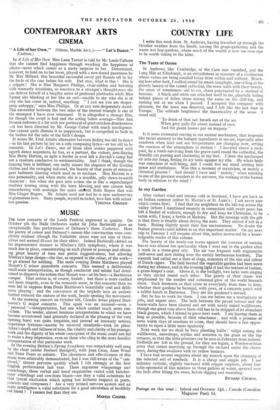The Taste of Ozone St. Andrews, like Cambridge, or the
Caen now vanished, and the Long Mile at Edinburgh, is an embodiment in masonry of a civilisation whose values are being assailed today from within and without. Reach- ing here after dark, I walked round by street-lamplight, marvelling at the ghostly beauty of the ruined cathedral, the town walls with their towers, the sense of remoteness out to sea, chaos punctuated by a method of beacons. A black and white cat attached itself to me, playfully hiding behind pieces of fallen stone among the ruins on the cliff-top, and rushing out at me when I paused. I accepted this company with pleasure, for the town was deserted, and I felt like the last man in Europe. The solitude heightened the theatricality of the scene. I stood still " To drink of that salt breath out of the sea When grey gulls flit about instead of men, And the gaunt houses put on majesty."
Is it some elemental craving in our animal mechanism, that responds like racial memory to the halogen ingredients in sea-sir, especially after sundown when land and sea temperatures are changing over, setting the essences of the atmosphere in motion ? I hovered above a rock- pool, by a tomb surviving from the grave-yard round the cathedral, the friendly cat purring and chattering at my feet. I drew the surcharged air into my lungs, feeling its icy tonic against my ribs. My whole body was conscious of well-being, and I could feel my mind settling into peace and restfulness. Was this a moment of mysticism, or merely a chemical process ? And should I have said " merely," when referring to one of the greatest wonders in the universe, the working of the human body in relation to the mind ?


















 Previous page
Previous page